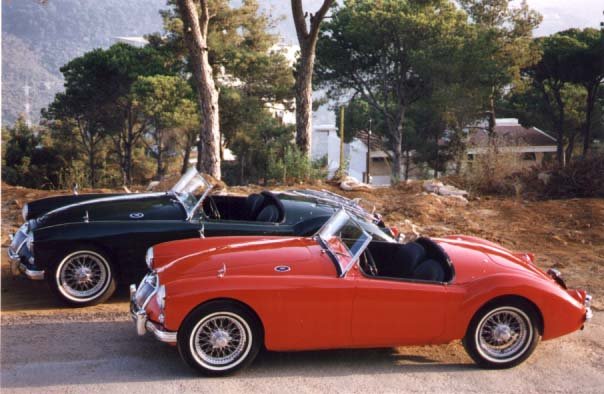
The idea is deceptively simple. Forget about fancy batteries, regenerative braking, and alternative fuels. Instead, make a car that's elegant in its minimalism and efficiency. The Loremo's German designers revisited the basics — engine efficiency, low weight, and minimal drag — to create a car that offers fuel-efficiency in the neighborhood of 130 to 150 miles per gallon. The Loremo is likely to dazzle drivers not with its acceleration, but with its ability to drive from New York to L.A. with only three stops at the pump.
Loremo stands for low resistance mobile, and its engineers have stuck obsessively to this idea. By building the car around a 2-cylinder turbodiesel engine, and cutting back on weight, drag, and other excess fat such as side-opening doors, the Loremo puffs out a mere 50 grams of carbon dioxide per kilometer. This is about 40 grams less per kilometer than the tiny diesel smart. According to its creators, this will make the Loremo the most efficient production car ever sold.
If the Loremo showed up as a concept on an auto show pedestal, it would certainly garner some attention. But the Loremo is not a car for dreamers; not only will it enter mass production next year, it will sport a base price attainable by mortal motorists: 15,000 euros (about U.S. $22,000).
After its 2009 release in Europe, the Loremo will be redesigned to reach the North American market the following year. A $30,000, 3-cylinder GT model will also become available, offering better acceleration (0-60 in roughly 10 seconds, vs. 16 for the base model). Both hybrid and fully electric versions are also in the works.
Driving Simplicity
While the Loremo goes back to basics to come up with triple-digit fuel economy, it took some outside-the-box thinking to get there. The most striking difference is the way passengers enter, with the car's front end yawning forward — hood, windshield, and steering column included. Upon settling in, the front end closes, swinging the dashboard, touch-screen display, and steering wheel back into position. The driver is then surrounded by a minimalist design aesthetic not unlike the ultra-efficient Aptera, but with a bit more Germanic twist.
Opening the trunk hatch reveals two rear-facing "youth" seats, both of which are removable to free up storage space. Seating in front is also snug, with the driver and front passenger nearly shoulder to shoulder.
If it sounds like the Loremo boasts all the disadvantages of a sports car (tight squeeze, low headroom, awkward entry) sans the adrenaline rush, its winning traits may be undeniable efficiency and modest cost. And validation could be on the horizon. The Loremo was one of the first cars entered in the Automotive X PRIZE, a high-profile contest offering a purse of $10 million or more for a vehicle that can prove 100-mile-per-gallon performance as well as economic viability. Luckily for the Loremo, it's not a drag race.
Gerhard Heilmaier, CEO of the Munich-based Loremo AG, says that a car's weight is the key factor in making it green, no matter what the fuel: "Cars need to be downsized. Why do we need two tons of steel to bring a 180-pound human from one place to another? That must change."
Running the Loremo on biodiesel (a vegetable-based diesel substitute) is an attractive option, but Heilmaier insists that efficiency comes before all else. "The first step must be to reduce the amount of energy you need. The second step is to choose which energy it is. Even electric vehicles are not zero emission. Think of where the electricity is coming from."
The Diesel Returns
While American carmakers have greened their vehicles mostly with hybrid-electric drives and ethanol fuel, Europe has been refining the rugged diesel engine and accentuating its high fuel-efficiency to cut greenhouse gasses and stanch oil consumption. Now it seems that American interest in diesel cars and SUVs is on the rise, with companies such as Audi, Mercedes-Benz, Volkswagen, BMW, and even Honda (the hybrid runner-up) bringing their diesel offerings to U.S. drivers. "The European diesels are really very civilized," says David Cole, chairman of the Center for Automotive Research, "and they have excellent engines."
At this year's North American International Auto Show in Detroit, Audi chairman Rupert Stadler unveiled the R8 V12 diesel sports car, telling his American audience that Audi is now "challenging the final piece of conventional wisdom" about diesel-powered cars. BMW also took the opportunity to foreshadow the arrival of more diesel cars and SUVs.
As gas prices rise and fuel economy laws stiffen, Americans continue to jump into hybrids with green stars in their eyes (in 2007, the Prius outsold the Ford Explorer). But even if the Loremo isn't exactly what American drivers are looking for, this staggeringly efficient car could serve as a powerful symbol of how far the diesel engine can go, and help break through some of that smoggy "conventional wisdom."
From Jacob Gordon at TreeHugger.com

